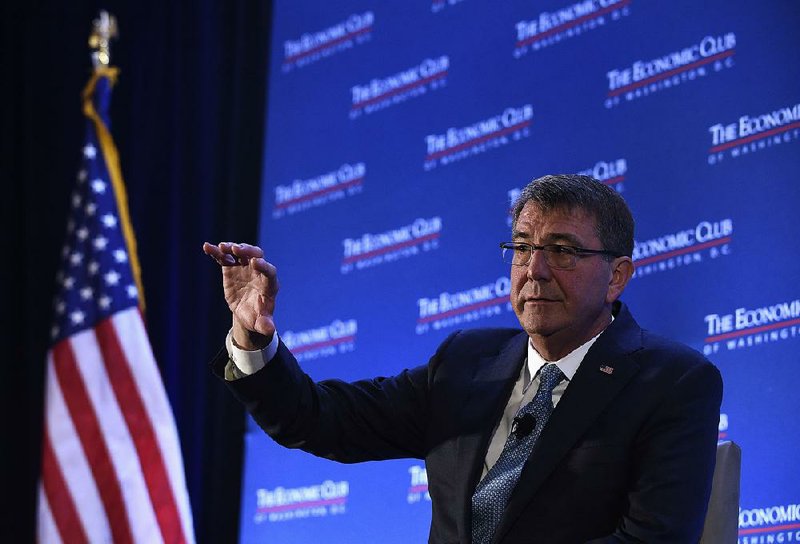WASHINGTON -- President Barack Obama's administration said Tuesday that it will propose quadrupling what it spends on its troops and training in Europe, as part of the U.S. military's efforts to deter Russia.
RELATED ARTICLES
http://www.arkansas…">Sides cite hurdles to Syria talks http://www.arkansas…">Fighting ISIS in Libya on hold
Obama, in his final budget request to Congress, will ask for $3.4 billion -- up from $789 million for the current budget year -- for what the Pentagon calls its European Reassurance Initiative, which was announced in 2014 in response to Russia's annexation of Crimea and incursion into eastern Ukraine. The president is also calling for a 50 percent increase in spending on the war against the Islamic State group, to $7.5 billion.
Defense Secretary Ashton Carter, giving an overview of the administration's proposed 2017 defense budget of $582.7 billion, described Russia as a growing challenge for the United States. He said the U.S. was taking a "strong and balanced approach" to deterring its former Cold War foe.
"We haven't had to worry about this for 25 years, and while I wish it were otherwise, now we do," Carter said in a speech to the Economic Club of Washington.
Obama, warning that Russia had taken an "aggressive posture" near NATO countries, called it a "challenging and important time" for the alliance, whose members in Europe are increasingly concerned about Russia's intentions after its incursions in Ukraine. Obama said the U.S. had taken decisive steps to bolster NATO since the start of Russia's actions in Ukraine, but that it hadn't been enough.
"It is clear that the United States and our allies must do more to advance our common defense in support of a Europe that is whole, free and at peace," Obama said.
NATO's top civilian official, Secretary-General Jens Stoltenberg, issued a statement applauding the proposed increase in spending in Europe.
"This is a clear sign of the enduring commitment by the United States to European security," he said. "It will be a timely and significant contribution to NATO's deterrence, and collective defense."
Michal Baranowski, head of the Warsaw office of the German Marshall Fund of the United States, a think tank, said the increased spending was a positive development and would be a "key ingredient" for success at a NATO summit to be attended by allied heads of government in July in the Polish capital.
"I think it's great news for Poland, the region and NATO as a whole -- the extra investment will make NATO's flank safer by more effectively deterring Russia. It's also an important sign of U.S. leadership that is badly needed at NATO," Baranowski said.
Addressing the beefed-up request for funding to fight the Islamic State, Carter said U.S. warplanes have been striking the extremist group in Iraq and Syria with so many precision-guided bombs and rockets that "we're starting to run low" on some types. "So we're investing $1.8 billion in 2017 to buy over 45,000 more of them," he said.
Carter also discussed proposals to boost spending on cutting-edge technologies and efforts to modernize the force to deal with longer-term threats.
The Pentagon's proposed 2017 spending plan will be unveiled next week as part of the federal budget proposal.
Over the past six months, during trips to eastern Europe and in NATO meetings, Carter has pledged additional military support.
The 2016 budget for military activities to reassure allies covered the costs of sending hundreds of U.S. troops in and out of Europe for short deployments, military exercises and other training missions. Carter's proposal to quadruple that amount would allow the U.S. to send more troops to Europe for short-term deployments and also provide additional equipment and improve facilities so more forces could be accommodated.
In Tallinn, Estonia, in June, Carter stood with defense chiefs from Estonia, Latvia and Lithuania and announced that the U.S. would spread 250 tanks, armored vehicles and other military equipment across six of the former Soviet bloc nations.
And he promised NATO that the U.S. would contribute weapons, aircraft and forces, including commandos, for the alliance's new rapid reaction force.
The Pentagon has already increased the pace of troop rotations in and out of Europe, providing training and other advice and assistance to the region.
The proposed spending increase comes a year after the Defense Department unveiled sweeping plans to consolidate its forces in Europe, taking thousands of U.S. military and civilian personnel out of bases mostly in the United Kingdom and Portugal, in an effort that was expected to save about $500 million each year.
The changes involved mainly Army and Air Force personnel and facilities, and would cut the number of U.S. defense workers in the United Kingdom by about 2,000.
The cuts in Europe are being driven largely by overall reductions in the size of the Army and Marine Corps, as well as the Pentagon's new emphasis on Asia.
Information for this article was contributed by Robert Burns, Josh Lederman and Vanessa Gera of The Associated Press.
A Section on 02/03/2016


